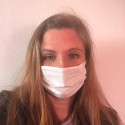Press Forward

Name: Jill S.
Type of Cancer: Myxopapillary Spinal Ependymoma
Diagnosed: Age 35, 2020
By: Jill
— Categories:
Adult
Spine
A Sudden Onset of Symptoms
Around the same time that extreme pressure was applied to my back, I developed many disconcerting symptoms including: neck and body stiffness, disorientation, eye pressure, nausea, double vision, eye floaters, tinnitus, dizziness, cognitive problems, heart palpitations, problems swallowing, shortness of breath, dementia-like symptoms, occasional extreme lower back pain, occasional abdominal pain, random myalgias, low blood pressure, tingling of both hands and feet, disequilibrium, head pressure, bowel and bladder dysfunction, caffeine intolerance and sudden weight loss. My symptoms were at first relieved on laying down but became progressively worse with time.
During a family trip, I knew something was seriously wrong when I began to experience the aforementioned symptoms including shooting and random pain that included my chest and my entire upper body. As my health deteriorated, I eventually collapsed at a store and ended up in the emergency room unable to walk, struggling to breathe and with a prolonged QT. Since the problems were exacerbated by sitting/standing, I became essentially bed ridden. Several more times over the next two months, I ended up in the emergency room with electrolyte imbalances, needing IVs. In the course of diagnostics, I had several MRIs done, one of which revealed soft tissue in my cauda equina at LWK3. Caught in the red-tape of hospital limitations during the initial stages of COVID-19, and unaware that there was a neurological emergency room just 30 minutes from me, I finally ended up in that emergency room (directed by another doctor at the same hospital whom I was on my way to see). Upon admission to neurology, test after test, revealed no obvious problem. Since many of my symptoms were head related, no one (including myself) was focused on the tumor as causing my problems. Thankfully, when I finally made it to a neurosurgery consultation, the decision was made to remove the tumor within two days.
The ependymoma was removed via resection. I did not receive radiation and it was not recommended.
Living Through Difficult Times
To paraphrase the words of T.D. Jakes, you have not lived until you’ve been through something. I connected with people whom I would have otherwise never met. I felt love without pre-condition, pre-meditation. Being in a state of debilitation and under high cognitive stress puts you in a totally different state of mind. The illness propelled life changes, including pursuing goals I’d been putting off for a long time. I was awed and inspired by my brilliant and gifted neurosurgeon and the great medical professionals in the field of neurosurgery. Always fascinated by the brain, I became fascinated with the world of physicians as both a science and an art.
Press Forward
I’m not sure I’m qualified to offer advice on cases far more serious than mine, but I will still offer the following advice for anyone who might benefit from it:
First, read the advice of Bruce under inspiration stories on the CERN site (Adult, Brain). Second, your body might not go completely back to normal right away. My wound and spinal fluid leak needed to heal before my breathing and head would return to a state of normalcy (whatever that is). This took about two months. Have the awareness that Spinal Fluid Leaks, can be a result of disc problems, tumors or anything that causes increased pressure in the dura, are far more common than realized and are completely debilitating. However, they DO/CAN heal on their own, especially once the underlying problem is resolved. A video on YouTube that was invaluable in educating me during my illness is called The Mystery Headache: Migraine, Positional Headache, Spinal Fluid Leak?
You might encounter many people who will think it is all in your head, but press forward. You know your body better than anyone else. One of my roommates in the hospital had to push hard before receiving treatment. I ended up in tears at multiple hospitals, at the height of the coronavirus scare, before I made it to where I needed to be. Today, I’m three months post-surgery and feel almost as healthy as I did before it all started. Finally, the best advice I can offer is not in my own words, but those of the Apostle Paul. And now these three remain: Faith, Hope and Love, but the greatest of these is love. Have faith that this life is a journey to the next. Find joy in those around you. Connect with them. Find camaraderie in the shared battle. Find humor in the irritated nurse (who insisted my clear pee was not actually pee), hope in each small victory and love in each interaction throughout the process.
The Power of Connecting with Others
From this experience, I have learned that things which seem to be a curse can be blessings. I learned that people (including these CERN members – many of whose stories I’ve read) are even more incredible than I had imagined. I learned that illness brings you closer to others, and to that in which you place your faith. For information on ependymomas. I read online research articles by the National Institute for Health (NIH), prior ependymoma patient studies and accessed information published by the CERN Foundation. CERN provides comprehensive information on ependymomas and is a means of contacting specialized ependymoma centers as well as inspiration and community. Feel free to reach out to me any time!
